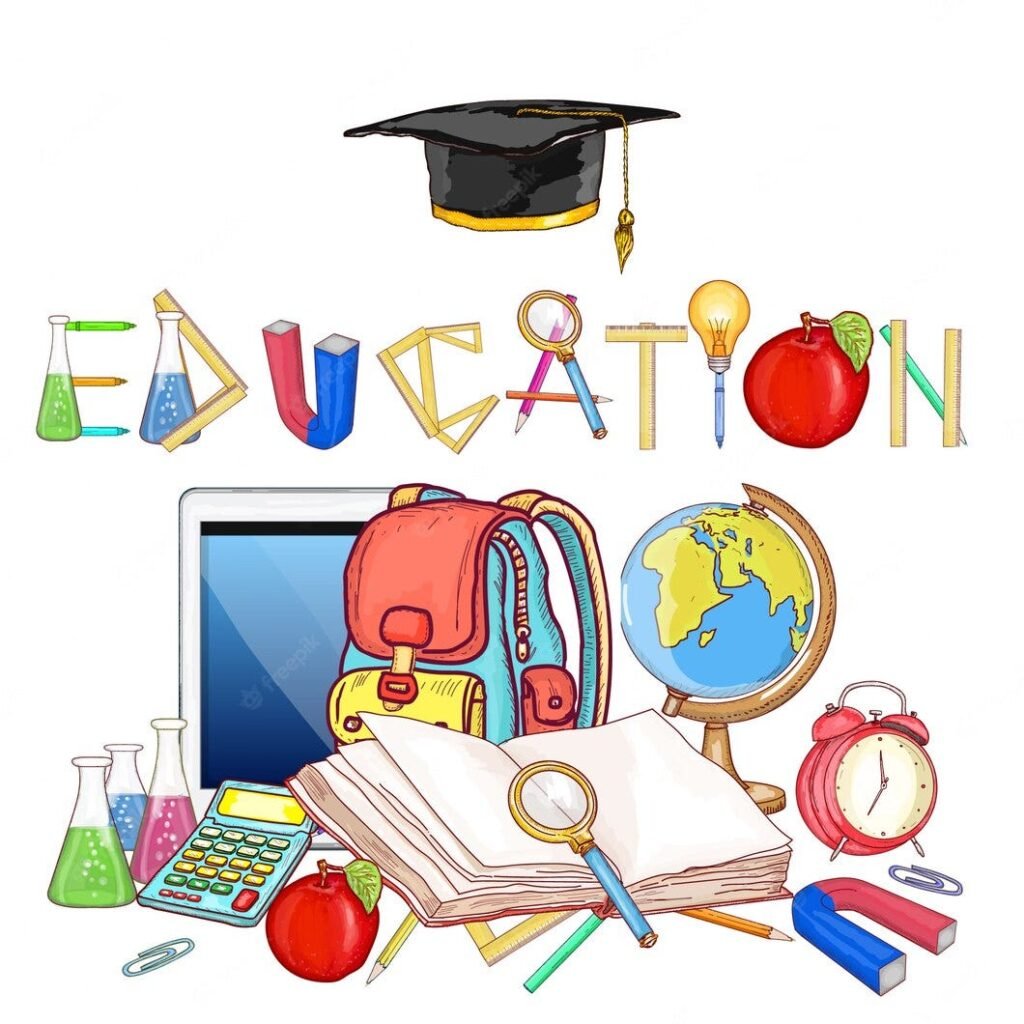Introduction: What Is Education
Contents
- 1 Introduction: What Is Education
- 2 The Comprehensive Learning Expedition What Is Education:
- 3 Empowerment and Personal Growth What Is Education:
- 4 Bridging Cultures and Perspectives:
- 5 Igniting Curiosity and Lifelong Learning:
- 6 Social Impact and Civic Responsibility:
- 7 Embracing Technological Integration:
- 8 Critical Thinking and Problem-Solving:
- 9 Lifelong Learning in the Gig Economy:
- 10 Cultural Competency and Global Citizenship:
- 11 Environmental and Ethical Awareness:
- 12 Student-Centric Approaches:
- 13 The Role of Educators:
- 14 Ensuring Access to Quality Education:
- 15 FAQs
- 16 Conclusion:
The idea of what is education has long been a topic of discussion in various arenas, from policy-making to societal discourse. It holds a profound significance that extends a ways beyond the traditional confines of textbooks and lecture rooms. In its truest form, schooling emerges as a dynamic and transformative adventure, shaping people, societies, and the worldwide panorama. In this exploration, we delve into the core of this multifaceted concept, looking to get to the bottom of the actual essence of schooling from a human attitude.
The Comprehensive Learning Expedition What Is Education:
What is education, at its essence, isn’t a trifling method of knowledge acquisition; it transcends the bounds of formal institutions and traditional mastering gear. It evolves right into a lifelong excursion, encompassing the improvement of highbrow, emotional, social and practical abilities. This holistic approach stretches past the classroom, embracing the profound classes embedded in normal reviews, interactions and demanding situations.
Empowerment and Personal Growth What Is Education:
Education will become the important thing to unlocking human capacity, empowering people to unearth their particular strengths, nurture critical thinking abilities and explore their passions. Beyond the assimilation of information and figures, schooling fosters creativity, resilience and flexibility, laying the inspiration for private increase and self-discovery. It propels people to emerge as knowledgeable, accountable and energetic individuals to society.
Bridging Cultures and Perspectives:
Serving as a bridge among numerous cultures, views and ideas, schooling transcends geographical and cultural barriers. It aspires to foster an international community that embraces range and values inclusivity. Through what is education, people gain a deeper know-how of the sector, cultivating empathy and constructing bridges of understanding across disparate lives.
Igniting Curiosity and Lifelong Learning:
At its core, training is a celebration of curiosity, sparking the flame of inquisitiveness that drives people to seek knowledge beyond prescribed curricula.

Social Impact and Civic Responsibility:
Through education, individuals develop an experience of civic duty, ethical values and an attention to social issues. It becomes an effective device for fostering social justice, equality and sustainable improvement.
Embracing Technological Integration:
In the ever-converting panorama of the twenty-first century, training finds itself at the intersection of innovation and lifestyle. Technological advancements have ushered in a new generation, though conventional notions of what is education. The integration of era, from on-line publications to interactive academic apps, serves as a transformative enabler, democratizing access to knowledge and fostering a culture of non-stop studying.
Critical Thinking and Problem-Solving:
What is education, in its truest shape, encourages individuals to question, examine and assume independently. As we navigate a complex international, cultivating essential questioning and trouble-fixing competencies becomes important. Education is going past rote memorization, nurturing the capacity to navigate ambiguity, make informed selections and contribute meaningfully to future answers.
Lifelong Learning in the Gig Economy:
The changing nature of labor in the gig economy emphasizes the need for continuing education, the traditional concept of schooling as a one-time event is being replaced via the information that learning is a continuous and evolving process. Individuals are now advocated to adopt an attitude of lifelong learning, adapting to changing capabilities, sectors and technology throughout their careers.
Cultural Competency and Global Citizenship:
Education performs a vital position in fostering cultural competency and global citizenship in state-of-the-art interconnected internationals. What is education exposure to diverse perspectives and cultural eventualities develops empathy and a receptive mindset. Educational institutions are increasingly spotting the significance of incorporating global views into their curricula, making ready students to navigate a global world that is becoming extra interconnected and interdependent.
Environmental and Ethical Awareness:
Addressing pressing demanding situations including weather trade and environmental degradation calls for an schooling that instills a feel of environmental and ethical recognition. Education will become a tool for cultivating accountable and conscientious those who recognize the effect in their moves on earth and society at large.

Student-Centric Approaches:
A paradigm shift from instructor-centric to student-centric approaches is underway. Personalized mastering plans, adaptive technology and bendy curricula cater to the individual desires and tempo of every scholar. This acknowledges that every learner is particular, embracing a model that tailors education to maximize each pupil’s ability.
The Role of Educators:
In this transformative adventure, What is education transition into mentors, facilitators and guides, moving beyond the position of facts disseminators. Their obligation extends to fostering an environment that encourages interest, crucial wondering and a love for mastering.
Ensuring Access to Quality Education:
Educational fairness starts with familiar access to excellent training, breaking down obstacles associated with socioeconomic repute, geographical vicinity and gender. Efforts to provide ok infrastructure, resources and certified educators to underserved communities are important for growing an inclusive studying environment.
FAQs
What is education important?
Education is crucial as it empowers people to reach their complete ability, take part efficiently in society and make a contribution to monetary development. It promotes crucial wandering, fosters creativity, and allows people to conform to change in an ever-evolving global environment.
What are the distinctive sorts of education?
Education may be labeled into formal, casual and non-formal kinds. Formal education refers to gaining knowledge of inside educational establishments like faculties, colleges and universities. Informal training occurs through day by day studies, interactions and self-directed gaining knowledge of. Non-formal education consists of prepared learning activities outside conventional schooling, along with workshops, seminars and vocational training applications.
How does education benefit society?
Education blesses society by fostering financial prosperity, promoting social brotherly love and advancing cultural development. It enhances productivity, reduces poverty and empowers individuals to take part in civic life. What is education also performs an essential role in addressing social inequalities and promoting sustainable development.
How can training be progressed?
Education may be advanced through a combination of policy reforms, investments in infrastructure and instructor education and network engagement. Strategies along with increasing admission to education, improving trainer effectiveness, integrating era into learning and selling lifelong getting to know possibilities can make contributions to improving schooling structures globally.
What position do instructors play in education?
Teachers play a critical function in schooling as facilitators of studying, mentors, and function models. They impart expertise, inspire curiosity, and offer steering to college students. Effective teachers create supportive learning environments, foster crucial wondering competencies, and sell lifelong getting to know behavior among their college students.
How does training make contributions to non-public improvement?
Education contributes to non-public improvement with the aid of nurturing highbrow increase, fostering emotional intelligence and promoting self-recognition. It enables individuals to develop crucial lifestyle capabilities, together with communication, hassle-solving and choice-making abilities. What is education also instills values, ethics and an experience of social duty, shaping people into well-rounded and engaged residents.

Conclusion:
The concept of What is education training is fluid and dynamic, extending beyond the traditional boundaries of formal education. Enlightenment, empowerment,\ and personal development are ongoing interests that benefit growing significance within the complicated panorama of the twenty-first century. Embracing a human perspective on education becomes critical, acknowledging it no longer merely as a way to quit however as a transformative force with the potential to steer people, societies and the destiny of our interconnected international network.



